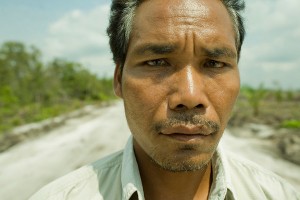
In a huge win for Indigenous and forest dwelling peoples throughout Indonesia who are struggling to assert their customary land rights in the face of massive palm oil expansion, Chief Justice Mahfud M.D. has ruled that two Articles of Indonesian law used to imprison community members are unconstitutional, unlawful and invalid.
Articles 21 and 47 of Indonesia’s Plantation Act are responsible for the widespread criminalization of forest community members who often end up in jail for defending their land rights against the ever-encroaching expansion of oil palm plantations. Since 2004, palm oil companies, police officers, courts and judges have based legal decisions on Articles 21 and 47. These articles allowed the police to persecute forest communities standing up for their rights, essentially deeming defense of human rights illegal.
Sawit Watch has documented more than 660 ongoing conflicts between Indigenous peoples and local communities with palm oil companies in Indonesia. Criminalization through Articles 21 and 47 led to the arrests and detentions of hundreds of community members. According to Norman Jiwan from Sawit Watch, the judicial review that led to this outcome came about in response to a request made by five victims of the Plantation Act’s concerned articles. The five victims are:
- Vitalis Andi and Japin are members of the Indigenous community from Silat Hulu in conflict with Sinar Mas in Ketapang District, West Kalimantan
- Ngatimin is chairperson of BPMP of Pergulaan village in conflict with London Sumatra
- Muhammad Rusdi, head of village Karang Mendapo community in conflict with PT Kresna Duta Agroindo, a Sinar Mas subsidiary oil palm plantation in Jambi
- Sakri, a farmer from East Java.
According to the Jakarta Globe:
Wahyu Wagiman from the Institute for Policy Research and Advocacy (Elsam), who represented the plaintiffs, welcomed the ruling as a relief to more than 600 traditional communities in the country that were threatened by the law. ‘Our next step is to spread the word as wide as possible and to find a way to release farmers currently charged under Articles 21 and 47, including Japin, Vitalis and Ngatimin.’
During my field visits in West Kalimantan last fall, I recorded video interviews of numerous community members fighting for justice, working around the clock to get their fellow community members out of jail. From the community of Long Teran Kanan drawing a line in the sand in response to IOI Corp. failing to recognize their native customary lands to the recent criminalization of community members in Jambi where Wilmar bulldozed Indigenous settlements for palm oil, this legal victory is a ray of hope in an otherwise dismal landscape for Indigenous rights in Indonesia. Criminalizing Indigenous peoples for taking a stand to protect their native customary land rights is unjust. This recent court ruling is a step in the right direction and bodes well for human rights.